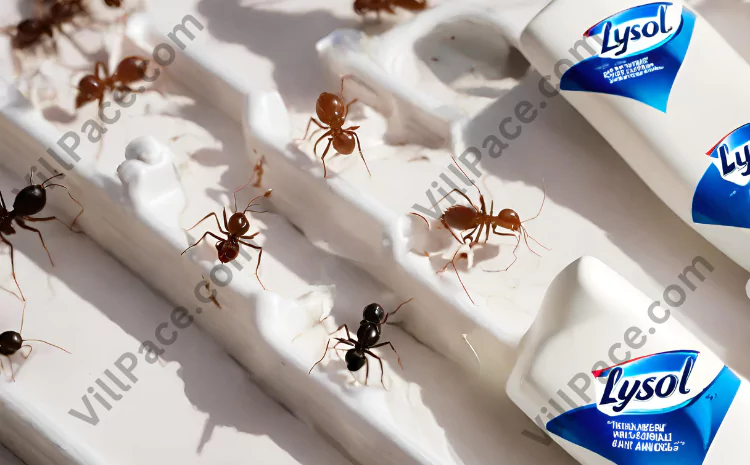Unwanted ant trails through kitchens and bathrooms torment households globally, notorious for ruining food supplies and spreading bacteria. Their resilience often withstands initial amateur extermination attempts. Thus pestered homeowners understandably wonder if common disinfecting products like Lysol offer an accessible, affordable remedy stopping ants in their tracks.
This investigative guide answers the pressing question: does Lysol kill ants both on contact and residually, making it a viable removal solution? Evidence suggests limited efficacy short-term, yet various deficiencies prohibit recommending Lysol alone fending off ant colonies permanently.
Key Takeaways
- Lysol spray does kill ants upon direct contact, but lacks ongoing residual activity.
- Used along other treatments like bait gels, it temporarily disrupts trails as part of an integrated approach.
- Limitations preventing long term control or nest eradication warrant considering specialized ant killers instead.
How Lysol’s Ingredients and Toxic Effects Impact Ants?
Lysol contains ethanol solvents and essential oils – compounds generally harmless to humans following label directions, but lethal to small insects.
Alcohols dissolve protective waxy coatings on exoskeletons while volatile oils overwhelm respiratory systems. Lysol also utilizes the antimicrobial agent benzalkonium chloride compromising cellular membranes.
These properties classify Lysol as an insecticide if directly sprayed, rapidly attacking nervous systems similar to commercial grade cypermethrin, pyrethrum or tetramethrin.
For ants, tissues and organs collapse upon exposure. However residual effectiveness and nest penetration shortcomings exist.
Lysol Spray Effectively Kills Ants Hit But With Limitations
Many consumers report prompt 100% mortality spraying Lysol concentrate directly onto ants both indoors and along exterior foundation trails. This makes it satisfactory stopping isolated intruders crossing countertops one by one.
Hitting crops of twenty ants at once, the frontline perishes while rear troops simply reroute trails, failing to halt the colony altogether. Furthermore, limitations emerge:
- Lysol’s volatile compounds flash-evaporate rather than offering ongoing residual activity stopping new ants later.
- Nest penetration proves impossible given repellency, preventing eradication of queens and larvae.
- Lysol lacks attractants luring ants intentionally like sweet baits, restricting contact opportunities.
Without residual action or nest intrusion reaching reproductive heart of hives, Lysol constitutes a supportive trailing disruption tool rather than standalone solution.
| Advantages of Lysol Spray | Disadvantages of Lysol Spray |
|---|---|
| Rapidly kills ants directly sprayed | No residual potency to kill later ants |
| Inexpensive and accessible household item | Doesn’t reach nests to kill queens/larvae |
| Disinfects surfaces along the way | Lacks attractants pulling ants intentionally |
These downsides demand dedicated pesticides better succeeding, but Lysol helps temporarily when utilizing alongside.
Alternative More Effective Products Killing Ants Long Term
Lysol makes an satisfactory supplemental tool disrupting trails conjunction with other weapons targeting entire colonies:
Baits Containing Slow-Acting Toxins
Recruited scout ants carry poison pellets deep into the nests. Then they perish slowly over days while inoculating and killing from within through cannibalism and food sharing. Eventually residual concentration eliminates queens. Brands include Terro, Amdro and Advion pastes luring ants to feed intentionally.
Repellent Sprays Around Foundations
Long-lasting essential oil perimeter sprays warding ants for months include Ortho Home Defense and Spectracide Triazicide Once & Done. They deter trails forming rather than relying on attracting insects.
Dusts Penetrating Wall Voids and Cracks
Boric acid / diatomaceous earth dusts penetrate wall voids and cracks. Ants traversing areas contact and spread such desiccant powders back to destroy reproductive members. Brands include Delta Dust and BASF Alpine Dust.
Unlike Lysol concentration diffusing quickly, ongoing residual potency from pastes, dusts and sprays maintains ruthless potency annihilating whole colonies over weeks.
Verdict: Lysol Kills On Contact, Not Colonies
Does Lysol kill ants? Definitively upon direct contact, but not comprehensively long term. Limitations around evaporative longevity and nest penetration cannot protect homes from reinfestation like advanced pesticides. Consider Lysol an emergency spot treatment disrupting trailing ants where they aren’t wanted, rather than complete removal solution. Combining Lysol spray with properly positioned potent baits, gels and repellent bands yields greatest impact eradicating colonies from your property permanently.

Mark Thompson, a seasoned pest controller, is renowned for his expertise in keeping homes and businesses free from unwanted intruders. With a passion for environmental sustainability and a deep understanding of pest behavior, Mark has become a trusted authority in the industry.
